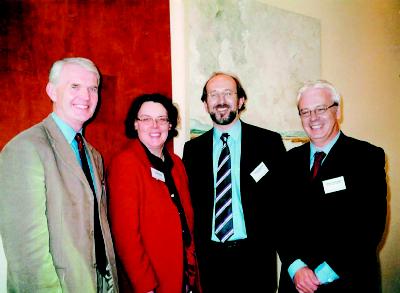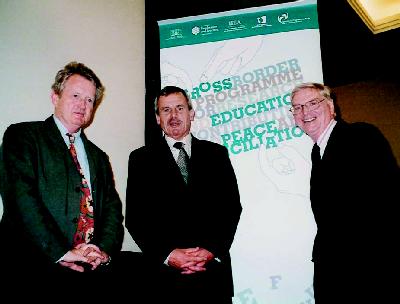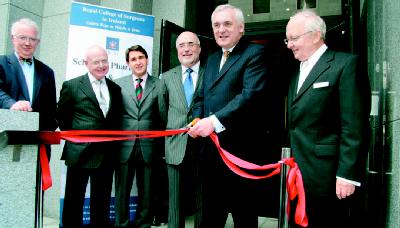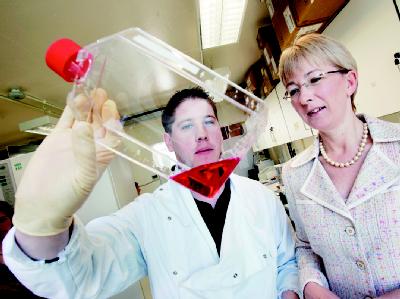| 2005 |

|
YEAR BOOK |
Higher Education Authority
|
An All-Ireland approach to research
|

Cross Border Programme for Research and Education contributing to Peace and Reconciliation
The Programme, which is aimed at impacting positively on the contribution to peace building, marks the first time that the Department of Education and Science in Dublin, and the Department for Employment and Learning in Belfast, have joined forces in a joint research programme.
Launched in 2003, there are currently five projects funded under the Cross Border Programme for Research and Education contributing to Peace and Reconciliation with a total of �3m being made available under the EU's PEACE II initiative. The Special EU Programmes Body based in Omagh is responsible for overseeing the implementation of the PEACE II programme.

"this research programme is people-focused. If the outcomes of the research are to have a truly significant impact, the researchers must engage with the wider community and make their findings known to those who are active, not only in research but in business, education, the voluntary sector, NGOs and other areas."
In all, seven institutions are participating in the following project areas:
1) Virtual Research Centre for Point-of-Care Technology: POC-Sensors
Institutions participating � Dublin City University, University of Ulster, Royal Victoria Hospital, Belfast
This proposal brings together two internationally recognised research centres of excellence, the National Centre for Sensor Research at DCU and the Northern Ireland Bioengineering Centre at UUJ, both with a proven track record in sensor research, and the clinical expertise of the Royal Victoria Hospital, Belfast.
This specific project involves the development of novel platform technology for producing low-density microarray biochips for point-of-care applications. These will be based on microstructured polymer chips with arrays of specific antibodies immobilised on the surface. The binding of specific antibodies to their target molecules (cardiac markers) will be monitored using fluorescence-based patented technology. This technology offers major advantages, which include increased sensitivity, speed of detection and low costs, and has major potential for point-of-care tests.
The focus is on cardiac markers, which are of major clinical and social significance on the island of Ireland, as well as having significant commercial potential.
2) E-Consultation: evaluating appropriate technologies and processes for citizens' participation in public policy
Institutions participating � Queen's University Belfast, National University of Ireland, Maynooth, Letterkenny Institute of Technology
E-consultation is the use of electronic computing and communication technologies in consultation and is complementary to existing consultation mechanisms. It is software used to support human mediation, negotiation and decision-making processes. The aim is to turn e-consultation in Northern Ireland and the border counties from an experimental idea to a practical option for community, voluntary and public sector bodies.
The objectives are:
|
a) To identify the social context and political implications of electronic forms of consultation and participation in Ireland, North and South.
b) To identify the e-consultation technologies and processes that are most appropriate to the needs of diverse local communities and to determine the best ways to apply these technologies and processes, focussing on the identified needs. c) To advise, help, study and evaluate at least two electronic consultation exercises over the project period, and report on what has been learned from them. d) To disseminate the results of our research through an online e-consultation guide and training workshops to help groups develop their awareness of and basic skills in e-consultation |
3) Equality and Social Inclusion: a framework for peace and stability
Institutions participating � Queen's University Belfast, University College Dublin, University of Ulster
Building on the extensive equality-related research and policy work already undertaken by the teams in UCD and QUB in collaboration with the University of Ulster and in consultation with non-governmental organisations (NGOs) and statutory bodies, this highly innovative project is designed to:
|
a) Develop and operationalise an equality and social inclusion framework for the promotion of social justice and human rights in both parts of Ireland. This framework will work as a tool for statutory and non-governmental organisations in devising equality policies, setting equality objectives and stimulating political dialogue and debate on equality issues
b) Devise a set of equality indicators and an equality index that can be used to assess and monitor the extent to which both jurisdictions have succeeded in meeting their stated equality and social inclusion objectives. |
4) Intergenerational transmission and ethno-national identity in the border area
Institutions participating � University College Dublin, Queen's University Belfast
This project links two existing centres of research on identity (as it relates to conflict and reconciliation) through a new collaborative project which will investigate intergenerational transmission of ethno-national identity in the border area. It has long been recognised that oppositional identities lie at the root of the Northern Ireland conflict.
This project will show how these identities are transmitted within the family, and the social conditions which may precipitate change. It will involve a series of inter-related studies aimed at highlighting social and familial mechanisms by which identity is transmitted and crystallised in oppositional form, as well as indicating the contexts in which identity change occurs. The results of this research will encourage greater understanding of identity development and consolidation and its relationship to macro-social (geographical, economic) and micro-social (family, school) contexts. This will inform mutual understanding and the development of more inclusive modes of identification.
5) Mapping frontiers, plotting pathways: routes to north-south cooperation on a divided island
Institutions participating � University College Dublin, Queen's University Belfast
The project's aims are:
|
a) To specify and assess factors which help and hinder informal and formal cross-border contact, and to inform future policy initiatives on issues such as cross-border partnership, questions of sustainability, potential for inter-communal reconciliation and the impact of European integration.
b) to kick-start a very high level of innovative research collaboration between university institutions north and south. |
News on the Programme for Research in Third Level Institutions (PRTLI)
The PRTLI, established in 1999, continues to have a major impact on the research infrastructure of the higher education sector with some 1,700 researchers now engaged in ground-breaking work across all disciplines.
The next phase of development of the Programme is being considered and planned. It is crucial for the future economic and social development of this country that the gains made under PRTLI and other research programmes are consolidated and expanded. Important advances have been made, and the HEA welcomes the establishment of the Cabinet Committee on Science, Technology and Innovation which provides a focal point at the heart of Government where future strategies can be agreed.

"The focus for the higher education system now needs to be on producing talented researchers in the numbers required and on providing an environment in which research excellence can flourish. The next cycle of PRTLI will have a significant role in helping to bridge research performance to the targets set out in our national action plan. A key challenge moving forward will be to ensure the long-term sustainability of our research infrastructure."
With the institutes of technology soon to come under the remit of the Higher Education Authority, the HEA will be ideally positioned to play its role in the realisation of these objectives.

Research facilities funded by PRTLI opened since June 2004
| Centre/Institute | Full title | Lead Institution | Partner Institutions |
|
PHG Laboratories
BSN � extension. |
Programme for Human Genomics/Biopharmaceutical Sciences Network | Royal College of Surgeons | UCC, TCD, NUIM |
|
DMMC
(clinical facilities at Mater, St.Vincent�s University Hospital, St. James�) |
Dublin Molecular Medicine Centre | University College Dublin, Trinity College Dublin | RCSI |
| ECI | Environmental Change Institute | National University of Ireland, Galway | TCD, UCC, UL |
| FOCAS | Facility for Optical Characterisation and Spectroscopy | Dublin Institute of Technology | |
| IITAC | Institute for Information Technology and Advanced Computation | Trinity College Dublin | |
| NCBES |
National Centre for Biomedical
Engineering Science |
National University of Ireland, Galway
Sligo, AIT |
UCC, UL, UCD,
TCD, GMIT, IT |
| TCIN | Trinity College Institute of Neuroscience | Trinity College Dublin | UCC, UCD |
Contact: Dr Eucharia Meehan,
Head of Research Programmes,
Higher Education Authority;
Web: www.hea.ie